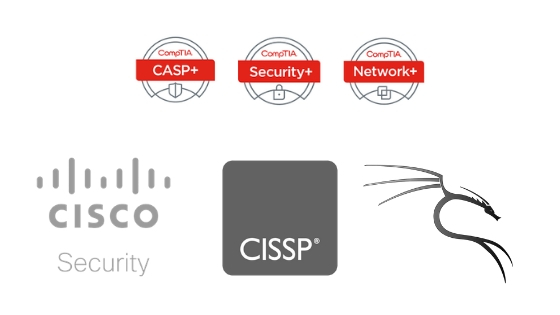Cyber Security Specialist

Cyber Security Specialist
Course Description
This certificate program provides the necessary knowledge for career-relevant industry certifications in cyber security Emphasis is placed on courses which enable the student to gain theoretical knowledge important for working in the field of information security.
Upon completion of all requirements the student will be awarded a Certificate in Cyber Security.
The Cyber Security program provides graduates with the necessary skills to succeed in today’s business, banking and defense world. Areas of study include cybercrime, ethical hacking, network security as well as digital forensics and security compliance legal issues.
The program prepares individuals to plan, organize, direct, and secure the virtual connections of a firm or organization. Students will learn to troubleshoot computer, operating systems, network switches and routers. The learner will also attain foundational skills in cyber defense to investigate, detect, and quarantine malware and be prepared for optional industry certification testing in A+, N +, S+, LXI+, Cisco Security, ECH, and Pen-Testing. The program prepares students to plan, implement, upgrade, or monitor security measures for the protection of computer networks and information. The graduate may ensure appropriate security controls are in place that will safeguard digital files and vital electronic infrastructure. The graduate may also respond to computer security breaches and viruses.
The program provides graduates with knowledge to work in information security governance, network intrusion forensic investigator as well as understanding the chain of custody for recording a digital cyber breach. The student will learn both hard and soft skills needed for this booming career. Typical job titles include Data Security Administrator, Information Security Officer, Information Security Specialist, Information Systems Security Analyst, Information Systems Security Officer, Information Technology Security Analyst (IT Security Analyst), Information Technology Specialist, Network Security Analyst, Security Analyst, Systems Analyst.
Cybersecurity Courses
2 Credits
30Hours Lectures; 60Hours Lab
This class will focus on network security methodologies to understand potential breaches. There will be hands-on labs to supplement each objective. These hands-on exercises will require students to practice their skills in a laboratory setting. This course will also describe the role of an ethical hacker, what an ethical hacker can do legally and what they can’t do as an ethical hacker. Students will also become familiar with laws that can affect an organization, especially if the organization is using testing methods such as Kali-Linux to conduct penetration testing on their network. Ethical hackers are sometimes hired by companies to conduct penetration test to find a weak link within the network. Students will also learn about the TCP/IP protocol stack, basic concepts of IP addressing and explain the importance of binary, octal, and hexadecimal numbering system.
2 Credits
30 Hours Lectures; 60 Hours Lab
This course teaches both the Linux and Kali Linux kernel module management, process and task management, print management, mail, SQL basic knowledge, system monitoring, networking, and security implementation for Linux and Kali-Linux platform. The first 2.5 weeks will be based on Linux and the second 2.5 weeks will concentrate on Kali- Linux. The idea is to help the student better understand how and why things work. Kali Linux is a security oriented Linux distribution, so it ends up being popular with people who do security testing or penetration testing for either sport or vocation. While it does have its general purpose Linux distribution and for use with forensics and other related tasks, it really was designed with security in mind. As such this course focuses on using tools that Kali provides.
2 Credits
30 Hours Lectures; 60 Hours Lab
This course is designed for Cybersecurity professionals tasked with penetration testing and vulnerability management. Students will gain the skills, knowledge, and ability to perform tasks on systems. The student will also learn how to secure a network as well as understanding the plan, scope and weaknesses of a system, not just exploit them.
2 Credits
30 Hours Lectures; 60 Hours Lab
This penetration testing course provides the student with the skills necessary to prepare them to work in one of the most in-demand career fields, where advanced hacking jobs now outnumber ethical hackers. This course can help make an employee indispensable to the IT department.
Computer Network
2 Credits
30 Hours Lectures; 60 Hours Lab
This CCNA security course teaches the student the understanding, implementation, and verification of security best practices on Cisco hardware and software. Students will learn common threats on Cisco router and switches, including blended threats, and how to mitigate them. The students will gain knowledge of the lifecycle approach for a security policy as well as comparing and contrasting intrusion prevention systems (IPS) versus intrusion detection systems (IDS).
2 Credits
30 Hours Lectures; 60 Hours Lab
This course is designed to help the student understand the information security landscape and will prepare them to become a security professional. Gone are the simple days of protecting a system from the random individual hacker. Instead, computer professionals are now combating a very organized, advanced, and powerful force that comes in many different forms, from script kiddies to nation states, organized crime to hacktivists, and everything in between. Some of the topics that will be covered are understand security basics, policies, procedures, physical security, perimeter security, network security, host security, application security, and data security.
2 Credits
30 Hours Lectures; 60 Hours Lab
This course uses a step-by-step approach for learning network fundamentals including components, platforms and technologies. Students learn how to configure, deploy, and manage wireless and wired networks with hands-on exposure to Cisco packet tracer. Students also gain knowledge and skills needed to install, configure, and maintain a network for a small business.
2 Credits
30 Hours Lectures; 60 Hours Lab
This Course teaches introduces advanced networking skills, such as firewall security, network customization, how to troubleshoot common network service issues and the characteristics of network topologies types and technologies such as SAN, NAS, and how to troubleshoot common network firewall settings such as incorrect firewall settings or incorrect ACL settings. This course also touches on cloud computing, as well as wireless standards and characteristics of network topologies, types and technology types. Network policies and procedures such as network documentation and network diagram symbols taught. Furthermore, students will learn about physical security, social engineering, network vulnerabilities and threats and commons network attacks. Network hardening and prevention is also covered in this course as well as network management and network optimization.
2 Credits
30 Hours Lectures; 60 Hours Lab
This course is designed to prepare the student to install, manage, repair, secure and troubleshoot PC hardware and Windows, Linux, and Mac operating systems. This course is designed to help the student gain real-world skills that they will use every day as a PC technician.
2 Credits
30 Hours Lectures; 60 Hours Lab
This course uses a step-by-step approach for learning the fundamentals of securing software. Students will learn in depth know-how of varied software, IT environments, computer, networks, troubleshooting software fundamentals, securing ports, installing and configuring various printer types, IPv4 and IPv6 addressing, Network connectors as well as learn how to secure various operating systems.
3 Credits
45 Hours Lecture; 0 Lab
This course is designed to develop written communication skills. Topics covered include understanding the writing process, analyzing readings, and practicing writing for personal and professional applications.
3 Credits
45 Hours Lecture; 0 Lab
This course is designed to introduce human behavior. Topics such as the Field of psychology, biological foundation of the brain, sensation, cognition and intelligence, human development, perception, motivation, personality, learning/memory, and stress are covered.
3 Credits
45 Hours Lecture; 0 Lab
This course is designed to introduce the fundamental concepts of a pre-algebra course. Topics such as whole numbers, fractions, decimals and integers, order of operations, percents, measurements and probability are covered.
3 Credits
45 Hours Lecture; 0 Lab
This course is designed to introduce valuable life skills needed for success in college. Topics such as goal setting, interpersonal communication, time management, stress management, dealing with change, fiscal responsibility, memory development, listening skills, note-taking skills, study and test-taking skills, basic writing skills, learning styles, and critical thinking are covered. Microsoft Office Word, PowerPoint and Excel are also included. This course is designed to introduce valuable life skills needed for career development.
FACULTY


Rob Peters
Instructor
Rob Peters has worked in many different capacities during his IT career. During the recession in 2009, he decided to switch careers and went to a career school to gather more knowledge and experience in IT. After graduation, Rob joined as an instructor, eventually becoming the Director of IT at his campus. Finally, moving to the Sacramento Campus, he helped design labs and courses, guiding students to become certified and job ready. After teaching for seven years, Rob started working for one of the State of California’s largest agencies, where he has worn many hats in the Server Applications and Support Unit. He has honed many skills and has become proficient in VMWare, SharePoint, Cloud Storage, and Remote Server administration, just to name a few. Wanting to return to teaching and making a real difference in students' lives, he spoke with his former boss, Orquedia Chavez (Associate Vice President of Campus Operations at InterCoast), and joined the InterCoast family. In his spare time, Rob is an avid golfer and guitarist and spends time with his wife and two dogs. He is here to help you achieve your goals and to share some of the knowledge he has gained in his career.
